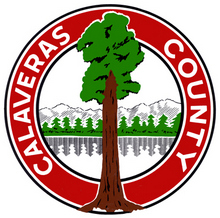San Andreas, CA…The Calaveras County Health Officer and Calaveras County Air Pollution Control District are issuing a joint air quality advisory to notify the public of the potential for poor air quality conditions primarily due to smoke from the Salt Fire in Calaveras County and from various lightning-caused fires around the state.

Areas of smoke may affect Calaveras County from the lower foothills up into the High Country area, dependent upon wind direction, until the fires are extinguished. In the evenings, smoke tends to move downhill, becoming more concentrated in lower elevation areas including the foothills and the lower river drainage basins. In the afternoon and early evening hours, conditions may improve as smoke rises.
Smoke contains very tiny particles that can be inhaled deep into the lungs. While all people may experience varying degrees of symptoms, the more sensitive individuals – such as young, aged and those with respiratory conditions – are at greatest risk of experiencing more aggravated symptoms. Symptoms may include, but are not limited to, coughing, watery and itchy eyes, headache, scratchy throat, and difficulty in breathing.
“Poor air quality caused by the nearby fires can lead to health problems for those at increased risk. Those considered sensitive to the unhealthy effects of smoke caused by breathing the small particles in the air include those with asthma, lung problems such as COPD, those with heart conditions, and those over 65 years old”, says Dr. Dean Kelaita, Calaveras County Health Officer. “Those considered at higher risk should take precautions to minimize their exposure to the smoky air”.
If you can see or smell smoke, avoid all unnecessary outdoor activities, especially if you are in an area where visibility is greatly reduced. Here are recommended ways to reduce your smoke exposure:
• Stay indoors with the windows and doors closed, if possible
• Do not run fans that bring smoky outdoor air inside – examples include swamp coolers, whole-
house fans, and fresh air ventilation systems
• Run your air-conditioner only if it does not bring smoke in from the outdoors. Change the
standard air conditioner filter to a medium or high efficiency filter. If available, use the
recirculate or recycle setting on the unit
• Limit outdoor exertion and physical activity
• Leave the smoke-impacted areas until conditions improve, if possible
• Reduce unnecessary driving. If traveling through smoke-impacted areas, be sure that your
vehicle’s ventilation system is on recirculate
• Do not smoke, vacuum, fry food, or do other things that will create indoor air pollution
• If you have asthma, take your medications and follow your asthma management plan
• Non‐HEPA paper face mask filters and bandana-type face coverings may be helpful in reducing
the spread of germs and viruses, but they are not capable of filtering out extra fine particulates
which are much smaller in size. Therefore, they will not be helpful in protecting individuals
from smoke-related impacts
Anyone experiencing serious symptoms due to smoke should contact a health professional. Persons who have a respiratory-related illness may also wish to consult their health care provider if they are experiencing smoke exposure.
Keep in mind that air quality can change rapidly at different times during the day due to wind shifts; therefore, it is important to monitor the smoke throughout the day in your area and make outdoor plans accordingly.
Information on air quality and smoke can be found at the EPA’s Airnow updated Fire and Smoke webpage at https://fire.airnow.gov which shows particulate matter data from permanent and temporary air monitors along with low-cost sensor data and smoke plume visualizations.
The Calaveras County Air Pollution Control District will continue monitoring the air quality in the county and will provide additional advisories as air quality conditions evolve.
For more information call the Calaveras County Air Pollution Control District at (209) 754-6588 or Calaveras County Public Health Department (209) 754-6460.


